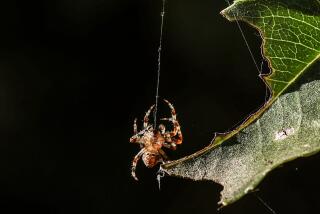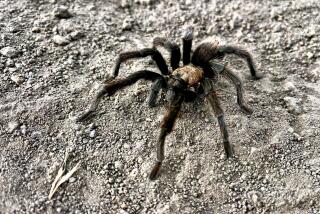Warrior or nanny? Social spiders’ personalities match their jobs
- Share via
If you thought spiders weren’t scary enough on their own, maybe it’s time to meet the social spiders – eight-legged creepy crawlers who actually live in colonies and raise their young together. Scientists studying these spiders with a pillowcase, a vibrator and computer paper have discovered that their personalities line up with their division of labor.
The findings, described in the Proceedings of the National Academy of Sciences, show that the division of labor in social colonies can extend far beyond the “caste” systems of insects such as ants or bees, and may apply to other social animals too.
Anelosimus studiosus spiders can be found from North to South America, spinning communal tangle webs on which several dozen spiders may live. The females appear to be either one of two types: aggressive or docile. Previous studies have shown that the aggressive females are more likely to attack intruders and defend the web, and that colonies with a mix of the two personality types do better in the long run than colonies with all-aggressive or all-docile spiders.
Division of labor tends to be a winning strategy; it worked for Henry Ford’s assembly lines as they pumped out Model T cars, and it works for well-known colony insects like ants, which have workers of different shapes and sizes for different tasks. Having a specific task to specialize in seems to create the most efficient, productive colony overall.
But here’s the thing: Unless individuals are actually shaped or sized slightly differently (as in the case of leaf-cutter ants), are they actually any better at their particular job? After all, simply having a job doesn’t mean you’re particularly good at it – even if it’s a job that you prefer.
To test the theory, scientists at the University of Pittsburgh and the College of Coastal Georgia nabbed spider colonies in eastern Tennessee by placing a pillowcase over each one and took them back to the lab. They formed new spider colonies that each consist of two aggressive and two docile females, daubed a bit of paint on them for easy identification and then watched to see how they did. They exposed them to a range of stimuli -- for example, they took a handheld erotic vibrator and held it to webs to see if the spiders would react to some fake “prey” (a fluttering piece of computer paper).
Sure enough, the dominant females were about three times as likely to hunt for prey, defend the nest against intruders and build or repair the web. The docile females, on the other hand, were roughly three times as likely to care for the young.
But does this mean the aggressive and docile spiders were good at their chosen jobs? They picked out single spiders and subjected them to individual challenges, as if they were on a reality TV show.
When the researchers tested the aggressive and docile spiders on an individual basis, they found that the docile spiders were less likely to pounce on easily available prey and that the webs they constructed were sub-par, compared with their aggressive peers. The aggressive females, on the other hand, weren’t so great at brood-rearing – they tended to attack and kill the babies while sharing food with them.
Given that these spiders are all shaped and sized the same, personality has something to do with division of labor in these creatures. And if personality plays a role in spider communities, it could play a role in any social species (including humans).
“Animal personality could be a powerful organizing force for an impressive diversity of animal societies,” the study authors wrote.
Follow me @aminawrite for more news from the world of creepy crawlers.






